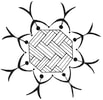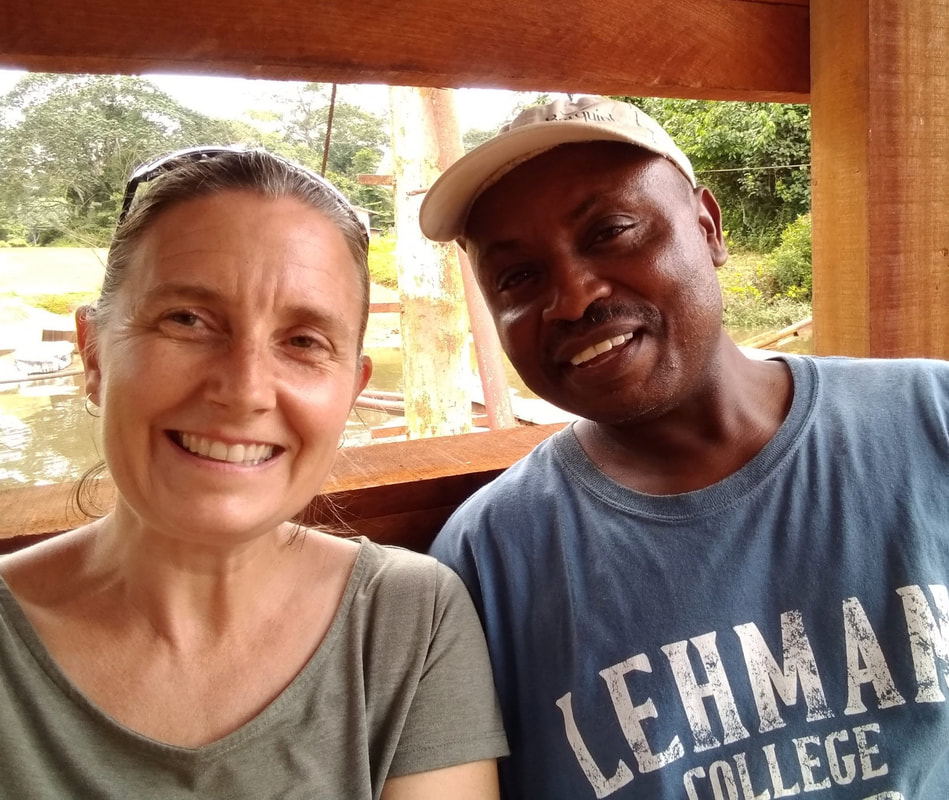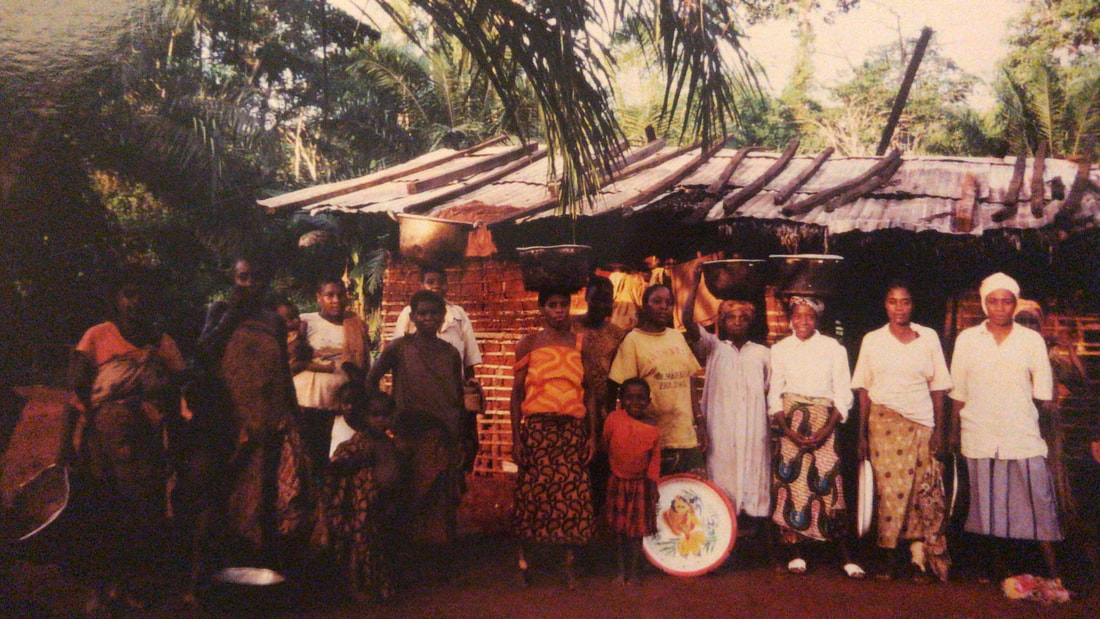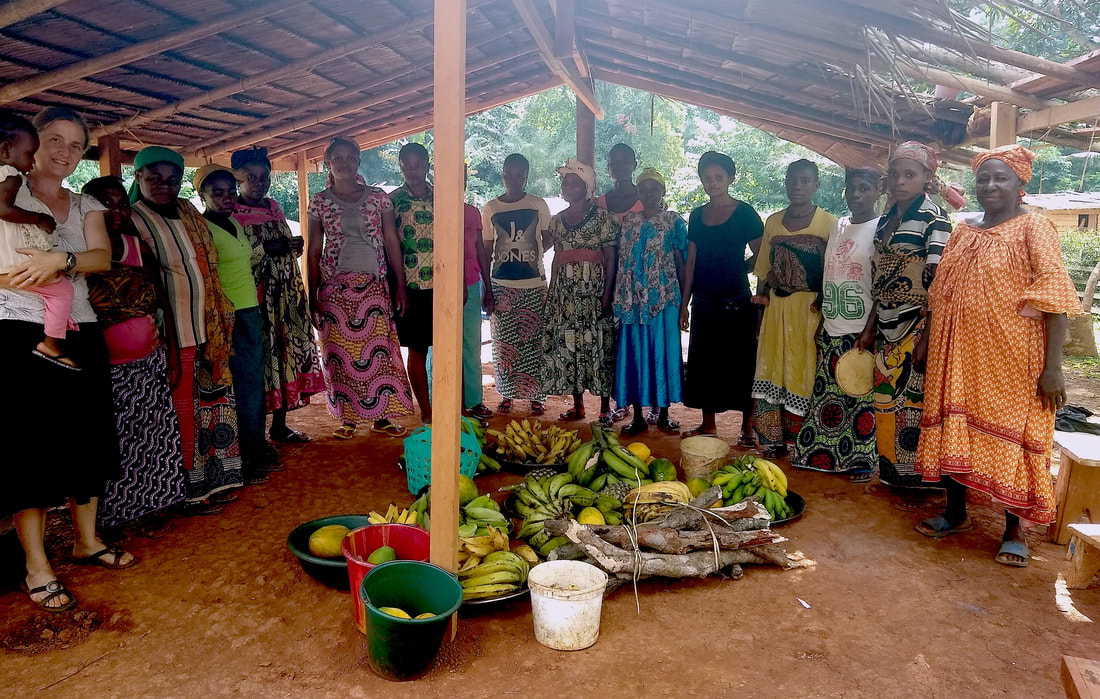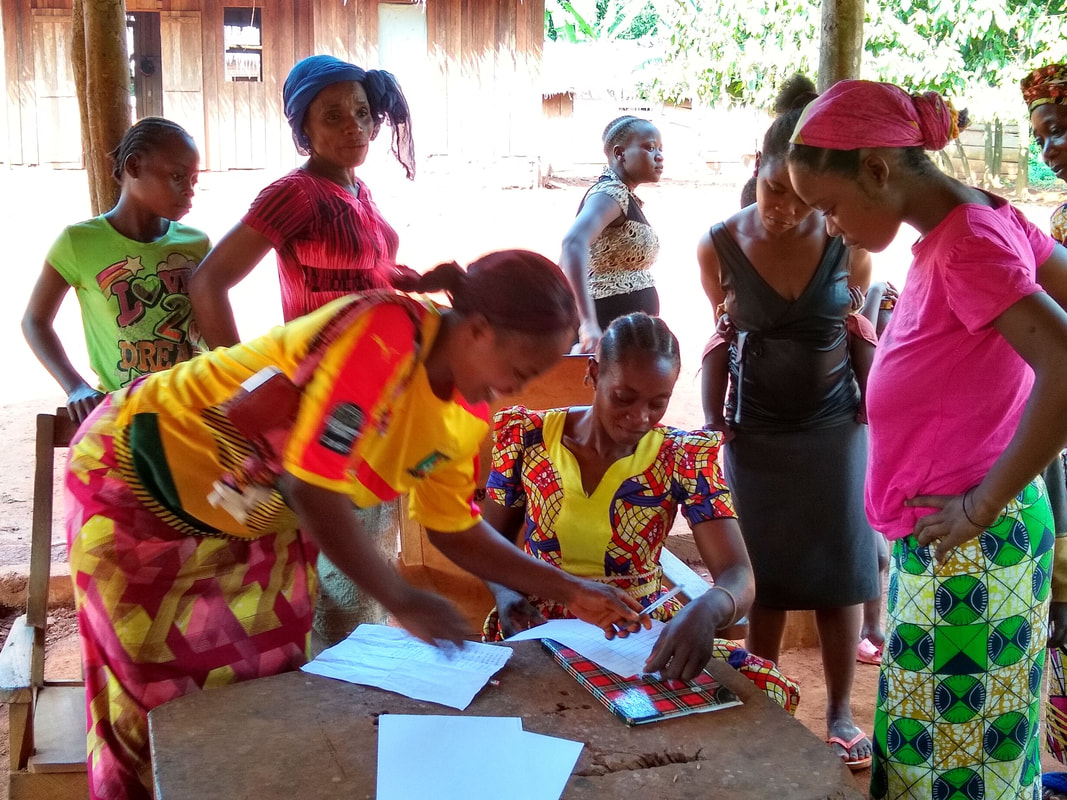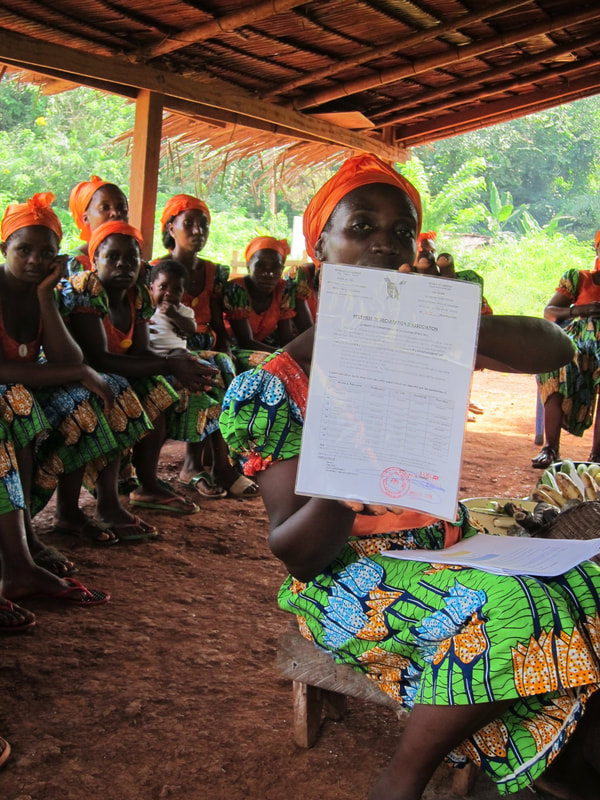Bi-weekly meeting of Essoungue-Dioula (AEEFD -- "Association Essoungue pour l'Entraide et l'Epanouissement des Familles de Dioula" or "Essoungue Association for the Mutual Aid and Development of the Families of Dioula." June, 2018
|
ESSOUNGUE - Dioula
Board members of Essoungue-Dioula
Essoungue-Dioula is an interethnic association of women living in the village of Dioula in southeastern Cameroon, 30 kilometers north of the border between Cameroon and the Republic of Congo.
The legal name of Essoungue-Dioula is "Association Essoungue pour l'Entraide et l'Epanouissement des Familles de Dioula" (AEEFD), or "Essoungue Association for the Mutual Aid and Development of the Families of Dioula." The official Cameroonian registration number for Essoungue-Dioula is 025/RDA/B12/SASC.
The Essounge-Dioula Board of Directors comprises Mayone Pascaline, Loukeli Georgette, Lufono Kouamanda Caroline, Adjimi Mokompea Danielle, Giaseh Kuamanda Noel, Molino Josephine, Yele Nicole, and Nikoue Clarisse.
|
ESONGE - USA
Board members of Esonge-USA
Esonge-USA is a non-profit organization whose mission is to support the women of Essoungue-Dioula, our sister organization which is located in southeastern Cameroon. Our federal tax ID is 84-3805916.
Esonge-USA was formally established in 2019, with the pro-bono legal counsel of Davis, Polk & Wardwell and the Lawyers' Alliance for New York. We are deeply grateful for this support.
The Esonge-USA Board of Directors comprises Debby Saito, Ilona Fricker, Stephanie Rupp, and Violet Fredericks. Polly Fanning joined the Board in June, 2020; as soon as we can get together again in person, we will update our Board picture! We are grateful to Marisa Brau for her ongoing consulting and administrative support.
|
|
The goal of Esonge-USA is to facilitate the important, collaborative work that the women of southeastern Cameroon undertake to ensure the socioeconomic well being of their families, and to build the future capacities of their villages. We have begun working with the village of Dioula, and expect to expand our work to other villages in southeastern Cameroon.
Esonge provides a bridge between funding opportunities in the United States, and perhaps also in other countries, and the socioeconomic development objectives of the women of Essoungue, in southeastern Cameroon. |
|
HOW WE STARTED...
|
|
Essoungue-Dioula and Esonge-USA are the initiative of Stephanie Rupp, an anthropologist who has been working in southeastern Cameroon since 1995. Stephanie met Ambata Philippe in the village of Dioula in the autumn of 1995, when she worked as part of a small team of biologists and social scientists, under the auspices of the Wildlife Conservation Society, to organize integrated conservation and development initiatives that would provide the foundation for the proposed Lobéké National Park. Ambata Philippe was one the village leaders in Dioula, working to form the community conservation committee in his village. It is in this context that Stephanie and Philippe met and began working together, forming a research partnership that continued throughout Stephanie's PhD studies in anthropology, Philippe's studies in agroforestry, and continuing with their shared research and village development efforts today.
|
Stephanie and Philippe at the Boumba River. (July 2017)
|
|
Women of Essoungue, Dioula Village, 1995
|
As part of her doctoral research, Stephanie engaged actively with the women of Dioula, including the traditional, interethnic association of women, Essoungue. Stephanie wrote about the important role that Essoungue plays in building collaborative networks of women, spanning differences in ethnicity and language, socioeconomic status, and geography.
|
Essoungue is a voluntary association of women that has existed for as long as any of the elders in Dioula can remember, going back at least to their own great grandmothers. As an association of women -- many of whom had left their home villages to marry into the patrilineal families of Dioula -- Essoungue provided an important social and economic network connecting women throughout the village, transcending ethnic lines. Essoungue was traditionally a very important resource for women who encountered unexpectedly difficult periods in their lives, such as the birth of twins, and extended illness, or a sudden death. At such times, the women of Essoungue would come together to provide a women in need -- and her family -- with basic essential resources: firewood, water, staple foods such as plantains and forest resources, and soap. Essoungue women would also be on hand to help the woman with domestic work.
|
You are invited to view the attached document, a .pdf of chapter five from Stephanie's book, Forests of Belonging: Identities, Ethnicities and Stereotypes in the Congo River Basin (University of Washington Press, 2011) in which she discusses the traditional Essoungue association.
| |||
Our Collaboration Expanded...
|
Ambata Philippe and Mayone Pascaline were married in April, 2000 in Moloundou, southeastern Cameroon. With Pascaline's arrival in Philippe's household, Stephanie and Pascaline developed a strong friendship.
Today, our families have continued to grow closer and closer through visits between southeastern Cameroon and New York City, where Stephanie and her family live. Philippe and Stephanie also continue to work together. In 2016 they presented a research paper together at the American Museum of Natural History in 2016, and Philippe spent a month visiting New York City. Stephanie's three children have visited Dioula multiple times, spending time with Pascaline, Philippe, and their family and getting to know the village and forest. Here is a handful of photographs to celebrate how our families have grown up together. |
|
Creating Essoungue-Dioula and Esonge-USA as Legal Entities
|
In the summer of 2017, when Stephanie was back in Dioula for a summer season of field work, she and Pascaline spoke with village women about their concerns and hopes for the children and young adults in their families, and for their village as a whole. Several resounding themes echoed across the women's comments: lack of reliable sources of protein -- in particular meat, fish, and other forest edibles such as caterpillars and shrimp; increasing precarity of the forest ecology as a result of unpredictable seasons and weather conditions; lack of opportunities for women to earn money to pay for their families' basic needs as well as medical needs and school fees; unreliable education for their children, and few opportunities for educational advancement.
Pascaline and Stephanie anticipated that the traditional structure of Essoungue could be developed as a mechanism for women in Dioula -- and perhaps then in the region -- to support each other to achieve goals of socioeconomic development for women and their families. Although Essoungue traditionally served as a network for cooperative assistance among women, offering resources and help during difficult periods in a woman's life such as birth, illness, and death, this organization for mutual aid could be organized proactively to bring women together to achieve the development, health, and educational goals that women had articulated for their families.
|
Essoungue-Dioula, 2017
When Stephanie returned to New York to teach at Lehman College at the City University of New York, Pascaline continued conversations with women in Dioula to gauge support and interest for participation in a newly constituted and formalized Essoungue Association. When Stephanie returned (with her children) the following summer, we were able to prepare the paperwork for submission of the Essoungue Association as a formal entity under Cameroonian Law. In October of 2018, Pascaline and her colleagues on the board of Essoungue presented their application to the Préfet of Yokadouma, the highest ranking government official in the Department of Boumba-Ngoko. Essoungue was legally established as a formal association. To celebrate the legalization of their association, the women of Essoungue chose patterned cloth to make matching dresses, which they wear to meetings and official events to highlight their solidarity.
|
Pascaline presenting the official documentation of the legal status of Essoungue to members of the association. (Dioula, January 2019)
|
Meanwhile, Stephanie began to organize Esonge-USA, which she and Pascaline hoped would become a bridge connecting funding opportunities in the U.S. with the women's projects in Dioula. Stephanie identified a wonderful board of trustees -- Debby Saito, Ilona Fricker, and Violet Fredericks -- and together they began to plan for Esonge-USA. With the assistance of the Lawyers' Alliance Network and the guidance of Dara Scheinfeld, a partner at DavisPolk law firm who oversees pro-bono work, Esonge-USA began the long process of becoming a legally recognized not-for-profit organization (within New York State) and 501(c)(3) organization at the federal level. Esonge-USA received its 501(c)(3) federal designation in February, 2020 -- just in time for Esonge-USA to support the women Essoungue-Dioula, as they prepare their families and village for proactive measures to prevent the arrival of COVID-19. This ongoing COVID-19 preparation work is described under the tab "Emergency Response: COVID-19", or you can click here: Emergency Response: COVID-19.
